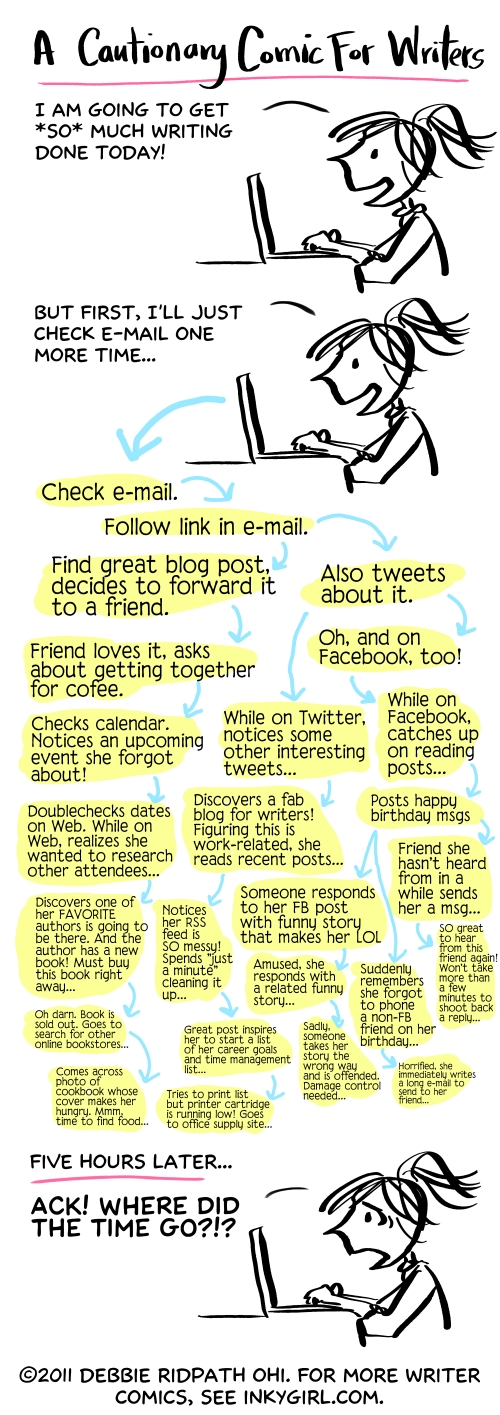
Of course, this isn't based at all from my own experience.
Ahem.

Of course, this isn't based at all from my own experience.
Ahem.
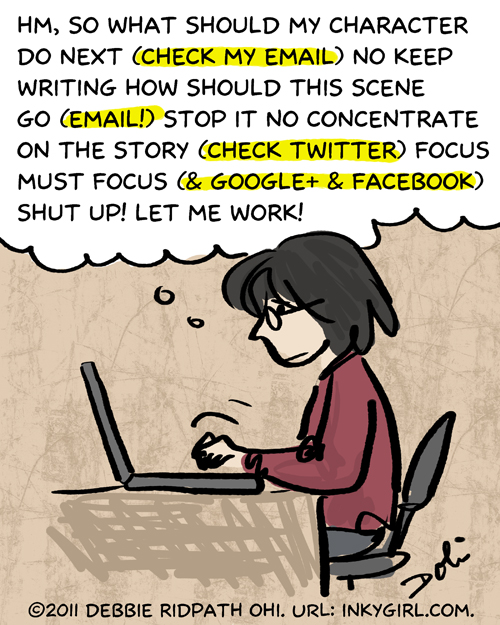
Know the difference between actually being productive and the illusion of productivity, especially when you're online.
![]()
Having trouble finding the time to write during the day because of interruptions or other distractions? Or fighting the urge to go look stuff on Google during your writing sessions?
(hand waving weakly here)
This year I'm going back to writing first thing in the morning to learn how to focus again. I have no problem focusing when I'm illustrating, or doing nonfiction or blog writing. When I'm doing fiction writing, however, I find myself constantly distracted.
Part of this, I'm suspecting, is insecurity. My theory: my subconscious is yelling "if you finish this new book, you're just going to get rejected again! I'm not going to let you finish!"
To my subconscious: I'M NOT GOING TO LET YOU TAKE CONTROL ANYMORE.
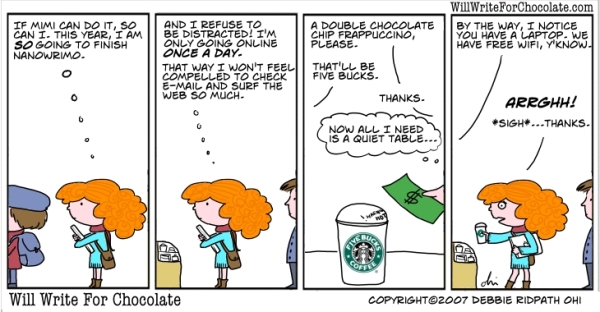
Julia Cameron suggests doing three pages of longhand, stream of consciousness writing, done first thing in the morning. I tried this some years back and while it worked for a bit, I just found the process of writing by hand too laborious; I'm so used to typing on the computer keyboard. I'm also aiming for a specific wordcount rather than number of pages.
Anyway, I'm trying to do some writing first thing in the morning, before anything else. I also gave this a shot early last year but got too easily distracted. Trying it again this year but instead of fighting the distractions and worries that crowd into my head as I'm writing, I'm EMBRACING IT. If I start getting the impulse to "just take a second" to go check something online, I put that into my stream-of-consciousness writing session instead ("Right now I'm fighting the urge to go look up xxxxx...").
Sounds silly, I know, but it seems to satisfy the part of my brain that needs to do something about the thought RIGHT THEN AND THERE, so I can keep on writing about other things.
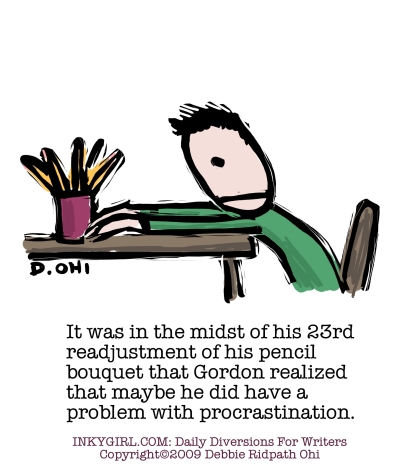
I'm also counting this as part of my Daily Words goal, which is currently 500 words/day. This morning I wrote 433 words but later today I'm going to do another writing session specifically for my own writing projects.
My hope: that the habit of writing first thing in the morning starts feeling more natural to me than my OoShinyToyMustGoogleIt and "just spend a few minutes checking social media" urges.
If any of you are having the same issues as I am, I encourage you to try stream-of-consciousness writing, first thing in the morning. Let yourself write ANYTHING: poetry, fiction snippets, personalstuff, whatever pops into your head....just keep writing and DON'T leave whatever app you're using to "just look something up" or check email.
Good luck! I'll check in later in a month or two to let you know how I've been doing as well.
---
The Challenge: 250, 500 or 1000 words/day. Also see my 250, 500 or 1000 words/day Facebook page.
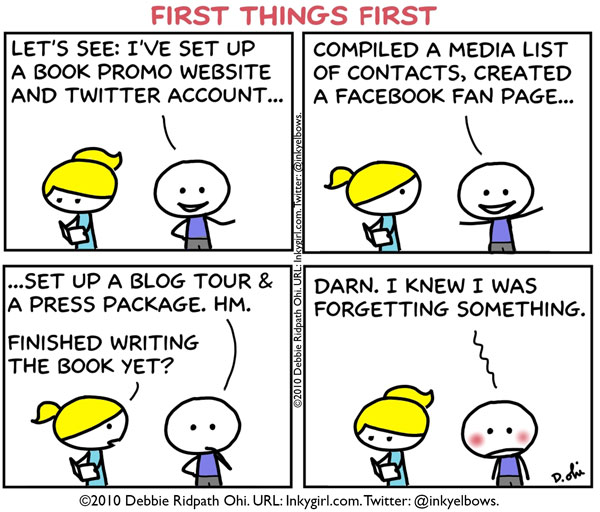
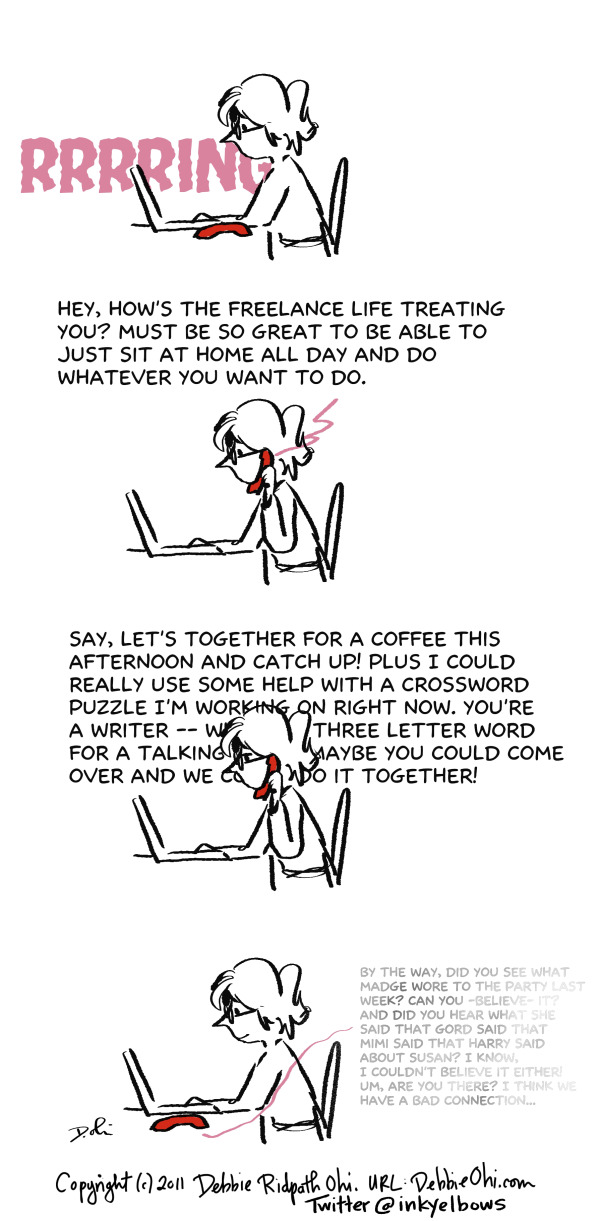
Note 1: No shed necessary. That's a promise!
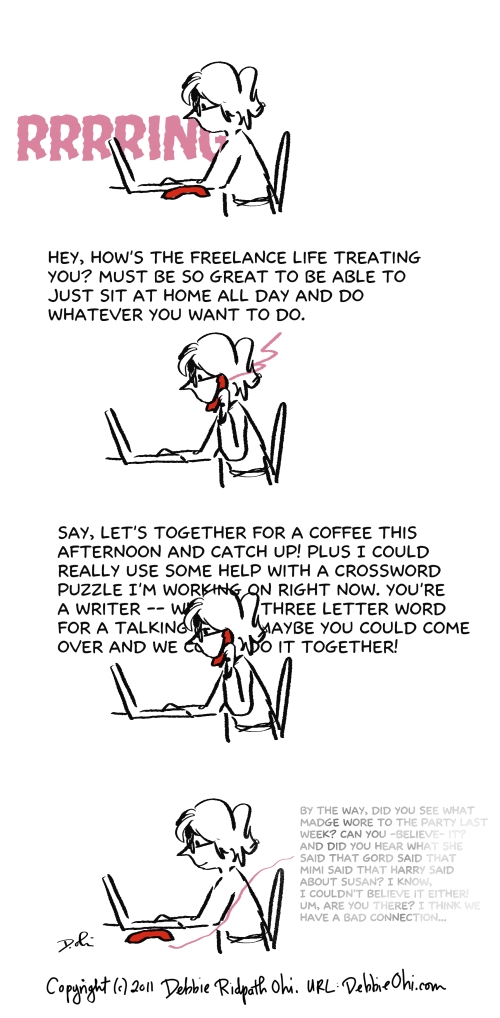
Originally posted in Writer Unboxed. See my other comics in Writer Unboxed.
 (First read The Dynamics of Change and Stage 1: Making Up Your Mind)
(First read The Dynamics of Change and Stage 1: Making Up Your Mind)
Okay, we’re ready for Stage 2: Committing to Change. This is not taking action yet. Instead, this stage involves:
1) Planning the necessary steps
2) Building up your motivation
3) Considering possible distractions and/or discouraging things that might cause a setback
The change you make at this point is to shift from “passively wishing to achieve your goal to actively committing to make it happen.” (Neil Fiore in Awaken Your Strongest Self.) If you did the work in Stage 1 (thinking through the risks and benefits, plus evaluating your personal abilities), you should have fairly realistic expectations of what does–and doesn’t–work for you at your particular stage of life.
Before you plan the necessary steps to succeed in making permanent changes as a writer, you’ll want to take time to experiment in small ways. See what you like and don’t like. See what works for you–and what doesn’t.
Record your thoughts and feelings when you introduce these writing changes. How do you feel? What works and what doesn’t? You can’t fail at this stage. You are only gathering information.
Some of these changes you’ll love and find so easy! Others you won’t find helpful at all. But as you succeed with certain writing changes (writing 15 minutes each evening while supper cooks, reading 5 pages per day of a writing book), your motivation will rise. You’ll feel more like a writer automatically.
During this stage you also need to think through strategies for dealing with obstacles, distractions and setbacks. One of the most effective (and fun!) ways to do this is using what athletes call “mental rehearsals.” They imagine how they’ll handle challenges at each step along the way. [NOTE: This is not just wishful thinking. Current books on brain chemistry show incredible studies and brain x-rays, revealing changes made in the brain after "mental rehearsals."]
Envisioning how you will handle writing distractions (toddlers wanting to be entertained, friends calling to chat, school vacations) and setbacks (an editor rejects your novel after two revisions, computer crashes) helps you build stamina or mental toughness.
Use mental movies to confront each setback or distraction. Instead of your usual reaction (chocolate, TV, surfing the ‘Net), clearly envision yourself sitting tight, working methodically through your writing problem, piling up a stack of new pages, and keeping to your deadline with ease.
Not all interruptions and distractions happen to us. Be aware that you often seek out distractions as well. In order to escape writing blocks or manuscripts that just aren’t working well, we often attempt to escape the anxiety or boredom or agitation by looking for distractions.
The final part of Stage 2 is actually committing to the change. Take time to think and journal about the strength of your commitment. If you want to succeed–and make the success permanent–it needs to be more than a wish. It needs to be a strong intention.
So, what do you intend to do? What change(s) in your writing life do you intend to make? Now is the time to commit.
Add a Comment
While I’ve thought of myself as a great multi-tasker for years, I recently found that my multi-tasking was preventing me from completing writing. If I get lucky enough to be home for my… Read More ![]()
I'm gradually going through all my comic archives as I work on my Will Write For Chocolate book compilation, so am posting some of the oldies here in Inkygirl (sometimes revamped).
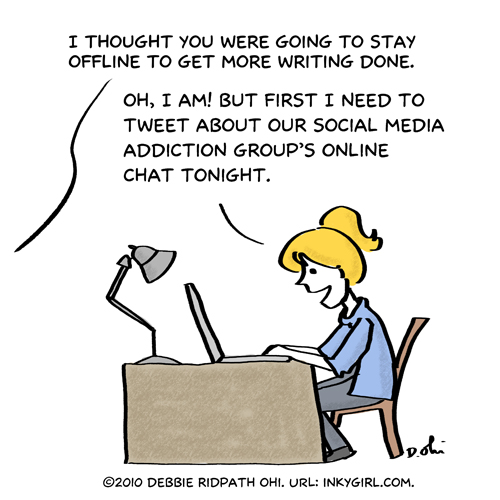
 I was wrong–again.
I was wrong–again.
For twenty years, I’ve told students and wannabe writers that you have to put the writing first! Do it before other things take over your day.
Fight the impulse to clean your kitchen first, or straighten your office, or clean up the mess the kids made before leaving for school.
“But I can’t work in chaos,” writers protest.
You know what? Neither can I anymore–at least not well! And when I force myself to, the work is doubly tiring. Doubly stressful. Much less satisfying.
Something I read today made me realize my advice might be a tad off. Not wrong altogether, since if we don’t make writing some sort of priority, we won’t do it. However, to eliminate energy drains in your life, you need to look at the whole picture. Certainly all the things you do in a given day take your energy. Every action you take on your lengthy “to do” list uses energy.
What you may not realize is that actions you don’t take use energy as well. Your disorganized office, the piles of laundry on the bedroom floor, the stack of bills to pay, the two birthday gifts to buy, the clothing needing repair–all this drains your energy reserves as well. It happens whether you are looking at the unfinished business or just thinking about it.
It siphons off energy that could be used in a much more positive way. “These items on your mental ‘to do’ list, the ones you’ve been procrastinating about, distract you or make you feel guilty and drain the very energy you need to accomplish your goals.” (So says Cheryl Richardson in Take Time for Your Life.)
Taking care of the unfinished business that nags at your mind–and keeps you from feeling like you can settle down to write–may be necessary before you can tackle your writing assignment. Don’t go overboard though, or you’re just procrastinating. Washing the dirty dishes is one thing–taking time to replace the shelf paper in your pantry is something else.
Figure out the things that you MUST have done to feel at peace in your environment, and do those things ONLY. (It helps to do as many of them as you can the night before too.)
Eliminate the chaos in your environment, and you’ll eliminate a LOT of the chaos that blocks your writer’s mind. Now…off to clean my office.
 When re-reading Getting It Done by Andrew J. DuBrin, PH.D., I came to a section on dealing with procrastination. One suggestion is something I’d like your feedback on.
When re-reading Getting It Done by Andrew J. DuBrin, PH.D., I came to a section on dealing with procrastination. One suggestion is something I’d like your feedback on.
He said you can make progress with procrastination if you “compartmentalize spheres of life.” He says that if you have multiple demands on your time that seem overwhelming, “mentally wear the same blinders placed on horses so they can concentrate better on the race and not be distracted.”
I would love to be able to do that on a regular basis! Are you able to compartmentalize? I agree with the author that procrastination is more tempting when multiple demands are swirling and competing in your mind.
I think that male writers have an advantage here. They seem able to put things in boxes, tape the lids shut, and then deal with one box at a time. (I know this for a fact because I can tell when I am being put in the “wife” box!)
Women, however, mix things up. Our concern for our child’s health or marriage problems or a sibling’s financial crisis “bleeds over” into our writing time. And we tend to feel guilty if we’re happily typing away while a member of our family is in trouble or needs us.
So…please share your wisdom with me. Men, if you can explain how to put things in boxes or make blinders work, please advise. Ladies, if you’ve figured out how to push aside your other concerns while you write, please share.
I bet we could all use some tips!
Add a Comment
 “Habits are the little anchors that keep us from straying very far from the lifestyle to which we’ve become accustomed, whether that lifestyle makes us happy or miserable,” says Karen Scalf Linamen in her book Only Nuns Change Habits Overnight.
“Habits are the little anchors that keep us from straying very far from the lifestyle to which we’ve become accustomed, whether that lifestyle makes us happy or miserable,” says Karen Scalf Linamen in her book Only Nuns Change Habits Overnight.
We all have habits that either support or hinder our writing lives. Habits are simply the ways we repeatedly do some things. Positive habits include daily writing practice, telling ourselves positive things about our abilities, and keeping current with publishers’ requirements.
Negative writing habits run the gamut from playing computer games and surfing the Internet during our writing time, to not keeping track of submissions and not studying to improve our craft.
Do you see any consistent patterns in your writing life? Which positive habits help you? Which habits detract from your ability to pursue your writing dreams consistently?
If you could redesign your writing life from scratch, which patterns would you reestablish? Which habits would you drop, if you could break them? Can you even identify the habits that are getting in your way? Do you wonder where your time is going, why you can’t seem to get around to working on the project that is so dear to your heart? Try journaling about it.
“Keeping a journal can help you identify hidden habits that are  interfering with your life,” says Linamen. “You can embrace the changes you want to embrace–and getting a handle on what’s really going on is a great way to begin!”
interfering with your life,” says Linamen. “You can embrace the changes you want to embrace–and getting a handle on what’s really going on is a great way to begin!”
A good writing life–a productive writing life–is built on good writing habits. They keep you anchored to the writing life you want to have, both now and in the future. Building good writing habits may not sound very exciting, but discipline now will give you a lot of freedom later on–and a writing life worth having!
Add a Comment
 Back in March, I wrote about pruning some things from life in order to have more time to write. (See my former post “The ‘Not To-Do’ List”.)
Back in March, I wrote about pruning some things from life in order to have more time to write. (See my former post “The ‘Not To-Do’ List”.)
In order to make time for anything new in your life, it requires some necessary endings.
So I was thrilled yesterday when my son-in-law loaned me a book by a favorite author of mine (Henry Cloud of Boundaries fame). It’s called Necessary Endings. It’s the best “how-to” on this “pruning” subject I’ve ever seen. It covers both personal/relationships and business. [Remember: if you're a writer, you're in business.]
I don’t know about you, but I have difficulty cutting things out of my life–even when doctors say, “Cut back or die!” (or the equivalent). This book has already helped me identify more clearly what needs to go. And, as Cloud shows, it all starts with having a clear idea of what you’re pruning toward (your goal or vision.) Only when you know that can you know what/who has to go.
You can download a free chapter from Necessary Endings called “Pruning: Growth Depends on Getting Rid of the Unwanted or the Superfluous.” Go to Facebook, do a search for “Henry Cloud (author)”, and you’ll find it. Just click the “Like” link, and you’ll have access to the free chapter and dozens of excellent short videos he’s posted.
Also, in the “Notes” section of his Facebook page, you’ll find a group study starting today on how to do this whole process of “necessary endings” in work, relationships, outside interests, and everything else (even good things) that keep us from being able to pursue the best things.
Add a Comment
 In the August edition of Randy Ingermanson’s free (wonderfully helpful) newsletter, there was a link to a free e-book describing a new time management system Randy is using. (For back issues of Randy’s newsletter, go here.)
In the August edition of Randy Ingermanson’s free (wonderfully helpful) newsletter, there was a link to a free e-book describing a new time management system Randy is using. (For back issues of Randy’s newsletter, go here.)
Since “free” is one of my favorite words, and I’m always looking for ways to manage my time better, I downloaded it to skim.
Skimming quickly turned to reading carefully, and soon I’d read the whole 57-page e-book by Jim Stone called Clear Mind, Effective Action. It deals with the subject of “fractal planning.” Fractal has to do with breaking something large into smaller parts. (You can get the free e-book here.)
In some ways fractal planning is unique, and some parts are a combination of the best time management ideas from the past twenty years.
In the free e-book, the author explains how to implement his system on your own (on paper or spreadsheet or Word document), if you don’t want to subscribe to his service. (I’m using a Word doc–for now–to see how it goes. I have to admit that–so far–it has boosted my productivity and ability to focus significantly.) If you’d like to go directly to the Fractal Planner page and check out the features, you can do that here.
If you try the fractal planner or read the e-book, let me know. I’d like to hear about your experiences–plus or minus–if you try it out.
Add a Comment
 All writers are looking for time-saving strategies and tips to increase their productivity. With school getting out in a month, many writers need to streamline both their writing life and personal life. If this is YOU, you’re in luck!
All writers are looking for time-saving strategies and tips to increase their productivity. With school getting out in a month, many writers need to streamline both their writing life and personal life. If this is YOU, you’re in luck!
If you have June’s The Writer magazine, read Kelly James-Enger’s article called “10 ways to work more efficiently.” And for some free articles on this subject…
Other Writer articles online filled with tips to improve your efficiency–and give you more time to write–include:
Reading these articles should give you several ideas to try. I found a couple I intend to put to work immediately!
Add a Comment
 Creativity is a mysterious concept to most of us. We don’t really understand what it is, where it comes from, why it leaves us, and how to make it “work” consistently. We give it a lot of power because of this.
Creativity is a mysterious concept to most of us. We don’t really understand what it is, where it comes from, why it leaves us, and how to make it “work” consistently. We give it a lot of power because of this.
However, says the author of The Soul Tells a Story, “if I know from experience that inspiration arrives under certain conditions, I will make sure to re-create the conditions that invited it initially. Thus my early experience comes to determine how it is I will work.”
After our vacation took an unexpected turn, I’ve had more time to reflect this week than the past five years combined. For four blissful days, I had no Internet connection, nowhere we had to be, plenty of books to read, places to walk, and time to think. I hadn’t really realized what an incredible luxury this is in the fast-paced world in which we live.
Because of marketing demands the last five years–both online and elsewhere–the writing life has been a bit frantic. I don’t know about you, but frenetic activity is not conducive to coaxing out my creativity. That much I already knew. But I hadn’t given much concentrated thought to what things did work for me.
Each writer is different. I know writers who must be surrounded by noise and people or loud music in order to write. I am just the opposite, preferring quiet and solitude when I can get it.
If you’re not sure what conditions are best for you, think back to when you started writing. How did you work best then? What conditions did you just naturally create for yourself? What are the non-negotiables you must have for your creativity to flourish?
Here are some things to consider:
As we’ve said before, just because conditions aren’t perfect doesn’t mean you can’t be creative. We’ve all had to produce work under some appalling conditions. But if you have a choice, it’s lovely to set up your life and home and schedule a
Add a Comment
 (First re-read the post The Thought-Feeling-Behavior Cycle.)
(First re-read the post The Thought-Feeling-Behavior Cycle.)
After a couple of busy weekends (writing conferences to speak at) and other events, I was finally able to sit down for a lengthy time yesterday and write. Or so I thought.
I sat down all right, but once I finally had an uninterrupted moment to think, a certain situation that has been bothering me for months came flooding back. I couldn’t concentrate on my novel, and I was up and down. I walked. I ate. I sorted laundry. I worried. I ate some more. Later in the day, I Skyped a friend. But I didn’t write until…
I picked up a book by Kelly L. Stone, author of Living Write: the secret to inviting your craft into your daily life. I flipped through it and landed on the chapter called “Acting As If.” I knew this was a phrase from my old recovery group days basically meaning “fake it till you make it.”
I reviewed the thoughts-feelings-action cycle. Since my thoughts were unruly, and my feelings were haywire, I figured that “acting like a writer anyway” was my best option. I read her chapter on “Acting As If.” Here are a couple snippets to think about:
A licensed professional counselor, Stone had many practical suggestions about how to act “as if” you’re a confident writer, act “as if” you’re a self-motivated writer, act “as if” you’re a self-disciplined writer, act “as if” you’re a future-focused writer, and act “as if” you’re a task-oriented writer. [I definitely recommend her book.]
I used one suggestion in the “task-oriented” section, acted “as if,” and got to work. Even though it was later in the day, I had the evening free and ended up with one of the most productive writing days I’d had in a long time. (I’m re-reading that chapter first thing today though!)
Don’t give up. We’re all in this together, and I’m grateful for writers like Kelly Stone who share what works!
[NOTE: Thanks for the inquiries about the release date for the paperback of More Writer's First Aid. I thought it would be yesterday, but it looks like this weekend. I will certainly let you know!]
Add a Comment
 I once had an apartment with one large hall closet. At first it was roomy and organized. Over the two years I lived there, it grew more and more crowded and chaotic as I stuffed more and more junk into it. One day, I realized I couldn’t jam one more thing in there and still close the door.
I once had an apartment with one large hall closet. At first it was roomy and organized. Over the two years I lived there, it grew more and more crowded and chaotic as I stuffed more and more junk into it. One day, I realized I couldn’t jam one more thing in there and still close the door.
Something was going to have to come OUT before more would go IN.
One year I took some online classes plus set up a self-study program to grow in my writing craft. It would require around four hours per day to do everything I wanted to do. Given the fact that I NEVER had four free hours in a day, where was that time going to come from?
One thing I love to do on January 1 is change calendars: wall calendars in kitchen and office, desk calendars (daily and monthly) in my office, and pocket calendars for my purse. The squares of the New Year calendar pages are virtually pristine and pure. An occasional appointment already made dots a square or two, but that’s all.
The calendars I pitch have perhaps one or two clean white squares per month with nothing scheduled. Just looking at them makes me feel tired. I know from experience, though, that the clean calendars will soon look just as jam-packed as the old calendars if I didn’t take steps NOW to prevent it.
But how?
To make time for some new things I wanted to do, I had to look at the calendar and find the time wasters. Some events are important to me and will stay on my new schedule: our weekly potluck supper with my grown kids and grandkids, teaching Sunday school at the Air Force base to basic trainees, my every-other-week critique group, leading DivorceCare at church, and blogging 3X/week. These activities feed my goals of a strong extended family, volunteer service, and growth as a writer.
However, I noticed a LOT of stuff on my calendar that could easily go. (Well, easily in the sense that I wouldn’t miss it. Difficult in the sense that it would mean saying “no” more often-and people pleasers like me hate that.)
I know the Internet eats up a lot of time for me. This year I’ve decided to stay offline until noon by adding the blog the night before so it posts automatically in the morning without me being online. Before I go to bed at night, I remove the laptop (which has the Internet connection) from my office altogether. It’s easier to deal with the temptation this way. Out of sight, out of mind! Reading other people’s blogs, posting on Twitter and Facebook, and answering e-mail can wait till later in the day.
No more “come and buy something” parties. I don’t like parties selling jewelry, home interior decorations, clothing, pots and pans, etc. I am also going to limit how many invitations I accept to showers. At my age, every woman is having grandkids and giving baby showers for friends having new grandkids. I rarely know their children or grandchildren. The shower only appears to take two hours, but by the time you’ve bought and wrapped a gift, gotten yourself ready, and driven to and from in heavy city traffic, it kills about eight hours. A gift card in the mail would be fine most of the time. (Not sure I’ll ever get up the guts to RSVP with, “Hey, I’ve never even met your kid, and I barely even know you, so I won’t be coming or sending a gift.”) Sounds very Scroogey, I know. But ooooh, so tempting.
I will no longer clean the house before the every-other-month visit by the Ork
Add a Comment
Distractions are going to be the death of my writing. The "platform building" aspect of writing: blogs, Facebook, Twitter, are important and deserve, as you mentioned, a selected time during the day for attention. But they can too easily start to be "productive procrastination" distractions as I numb out on the computer and avoid the creative work of writing. I. Must. Be. Better.
Computer and phone distractions are the worst. It does help to silence incoming e-mail, texts, etc., or even shut down everything except the Word doc you're writing. Easier said than done though!
I laughed at practice saying no. It does actually take practice--not so much the physical act of saying NO (although that may help) but the guilt/indecision--should I do this? after you say no. Believe me, I need to practice!
I needed this 'smack upside the head'. If my writing is going well, time just slips away and I lose track of everything else, to the point of letting the kettle boil dry. If I'm bogged down, everything else is appealing, from Facebook to running a load of laundry. MUST learn to focus and stick it out, no matter what. Thank you for the reminder and suggestions.
Julie, I see your point. Sometimes productive procrastination on tweets and Facebook posts can be a good thing. But the "numbing out" might be the moment to take a break. Then switch to your creative writing. Let me know if that works for you.
MP, sometimes it helps to set aside certain periods during the day when you are "off the grid." But let people around you know when that is so they won't get nervous about you not responding. No need to upset anybody.
This comment has been removed by the author.
Lynn, sometimes it's a good thing to do something else like the laundry when you are stuck. Just instruct your subconscious mind to find a solution to whatever is in the way. Going for a walk or meeting a friend can also give you new insights that will bring you back to your creative writing.